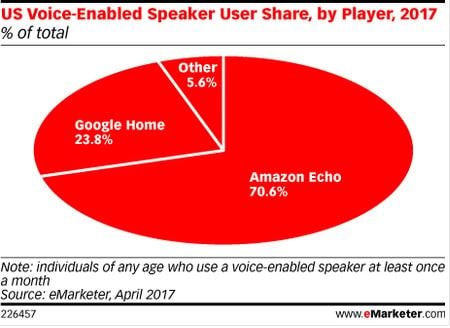AI-powered voice assistants are efficiently transforming the world with its advanced abilities in conducting natural voice based technology interactions in a natural way while delivering greater efficiency at a given time. With the increase in market scope for IoT, the significance for voice assistants, or voice chatbots have grown drastically. Here we discuss what makes voice assistants most relevant for the future and also discuss the transformation they are going to bring in the future.
Are Voice Assistants an Improvement Over Existing Speech Recognition Systems?
Prior to voice assistants there existed voice detection systems, but they failed to replicate a true human voice experience and lacked proper integration mechanisms with business systems. The voice-enabled applications like Alexa, Google assistant, Siri and Cortana are widely used. (The below prediction shows the market share of voice assistants in US)
To personalize voice assistants better, the voice application services are offering open architecture platforms, API’s, integration solutions and tools, to enable businesses to build their customized applications (called “Skills”) and service experiences as their business requires. These skills are the source for enabling voice assistants to be installed for various use cases. This is the fundamental reason that led to the building of a strong voice application ecosystem.
With the rise in the Internet of Things (IoT) field, these devices are finding a profound marketplace in business and home applications. In fact, voice assistants are acting as a catalyst for the IoT field.
Why are Voice Assistants Relevant for the Future?
The voice assistant’s skill to strategize and simplify the complexities in the communication process has resulted in the wide acceptance across various verticals including businesses, governments, home users, and much more.
1. Voice for Business
The openness offered by the enterprise voice assistants architecture is enabling businesses to offer their users natural voice experiences while communicating with the business systems like IT service management(ITSM), operations management, business management, IT functions, office management, and HR management. Observing the intelligent and natural communication experiences, no industry is an exception in the usage of voice assistants. This is what made voice as the key business strategy to watch.
Mark Madgett, Head of Agency & Senior Vice President, New York Life Insurance stated that close to twelve thousand agents are going to be availed with Alexa abilities in getting policy related information as well as scheduling and preparing for meetings. Also, banking and finance giant JP Morgan & Co is getting voice assistant Alexa to provide research and analytics reports to its clients. Capital One Financial Corp. is the first bank in the United States of America to offer Alexa services to its customers assisting them to bank from their place through voice interactions.
2. Voice for Marketers
For the E-Commerce industry, these enterprise voice enabled chatbots are a big thing to thrill their customers, by enabling them to shop online in a most conversational way-staying anywhere and on any device. On the other side, companies benefit a lot with consumer data which is more categorized based on interests, device, access location, purchase/search history, and so on. This data can be used to offer more personalized marketing efforts.
Voice is the next big way for us to be able to leverage data from a person’s car, home, or device,”
One more interesting case these voice chatbots have for marketers is user profile management. Say in a house there are many users and each person has varied interests. Based on their voice, these enterprise voice assistants create user profiles and their voice is used for authentication. The marketers based can push notifications or launch campaigns based on each user in one family. This way marketers can offer more personalization to the users.
3. For Smart Home Users
As on May,2017, 35.6 million Americans will use a voice-activated assistant device at least once a month, which is 128.9% than last year."
eMarketer
With Voice Assistants being enabled by AI and machine learning algorithms, we are soon to develop Iron Man kind of stuff: where you can talk to every home appliance, like a TV, refrigerator, thermostats, washing machines, coffee machines, bulbs, door locks, routers, house security mechanisms, and so on, and get the work done. This is already happening! With raises in IoT, we already see major players in home appliances getting their devices paired with voice assistants. Here is a short list of some interesting works:
- Whirlpool has made most of its appliances smart enough by enabling users to instruct the devices through voice either through google voice assistant or Alexa.
- Philips company has manufactured LED smart bulbs that are compatible with Amazon Alexa, Apple Home Kit, and Google Assistant. Users can instruct the bulbs through voice assistants either to change color feels.
- Belkin's Wemo automation appliances developed smart plug-in switches, lights, security cameras, and so on. These can be paired with Amazon Echo or Google home, where you control devices by voice inputs. Also, even if you are out somewhere from home, you can use mobile to control devices.
- GE has launched Kitchen Hub- a complete smart kitchen- at CES event in Jan,2-18. To know more detailed about GE kitchen Hub
- Nest launched Nest Learning Thermostat, a smart thermostat with self-learning capabilities and can be controlled by an Alexa App on a mobile.
4. Voice Assistants for Government Agencies
Observing the capabilities that AI Voice assistants are bringing to the business world, governments have been fast enough in getting these voice enabled applications to improve public service delivery efficiencies, as well as better internal workforce management with greater transparency. To know global government agencies that use chatbots, keep reading.
Check out the new-age voice assistant application:

















